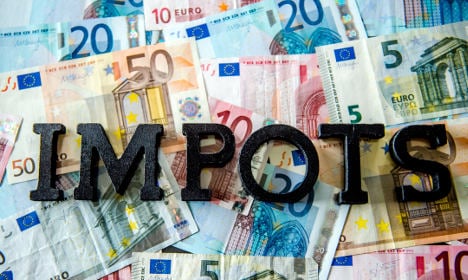French Finance Minister Michel Sapin signalled this week that a long talked-about reform will definitely go ahead and it affects most of us.
Sapin confirmed the change to the way income tax is paid and promised that the process would be “as simple as possible”.
So let’s see what that means.
What’s going to change?
Basically, the way we pay our income tax in France will change from us paying it ourselves one year late, to it being taken out of our pay automatically each month as we earn.
So currently workers in France either don’t pay their taxes on what they earned in 2015 until 2016, or, as most do, they pay estimated amounts, monthly or thrice-yearly, based on the previous years taxes.
But in future the money will be automatically deducted from our monthly salaries, in an employer based Pay-As-You-Earn (PAYE) as it is in most European countries.
This means that income tax goes from being an annual headache to just an extra line on your payslip, although the yearly tax declarations will still have to be made.

Is it a good idea?
While your monthly pay packet will obviously be reduced, given that the tax has already been deducted, there are certain advantages. For a start, if your salaries fluctuate, and apparently they do for 30 percent of French people, then it will take away the stress of having to put money aside to pay your income taxes a year later, when perhaps your earnings may have dropped significantly.
Although you can currently pay income tax each month for the previous year, many workers pay in one lump sum or in three yearly amounts. Plus in theory there should be a lot less paperwork without the annual back and forth between you and the tax man.
From the government's point of view, it helps in all sorts of ways, not least by the huge savings that will be made in administration costs. It will also help cut down on tax fraud, they say, and will give the government more regular income. It will also allow the government to more easily adjust its tax policies to the current economic conditions.
When’s it going to happen?
Finance Minister Sapin confirmed this week that the change will come into force on January 1st 2018. However the reform will need to get the green light from parliament first, and Sapin says this should happen in summer this year. In the summer of 2017 companies will have to contact fiscal authorities to find out what tax codes to give their employees. Then they will have to set up their new systems.
Is it just income tax that will be deducted monthly?
Nope, the reform will affect the tax on salaries but also pensions or replacement income like unemployment benefit, income earned by freelancers or “indépendants” as well as income on property. These account for the earnings of 98 percent of French households. So if you are working or retired your income will be taxed at source.

How will it be organized?
The minister confirmed this week that the job of deducting income tax from workers’ salaries will fall to the companies themselves, so accounts departments in French companies have a stressful year or two ahead it seems.
Business organizations are not too happy about this and fear added complexities to an already complex system.
The company will have to contact financial authorities to get a tax code for each employee to find out how much they should be paying. Then a slight tweak to the already complicated French payslips will see a line added showing how much has been deducted.
Tax will continue to be calculated on the basis of household or “family” earnings for those who are married or joined by civil marriage (pacsée) rather than individually. Nevertheless, each member of that household, so normally each member of the couple, will be given their own tax code, depending on what they earn.
That means that in the case of huge disparities in salaries, one member of the couple can take the burden for paying most of the tax, rather than it be split evenly. But the finance ministry insists the overall amount for the married couples will be the same.
Could we end up paying more tax?
The reform won’t change the calculations used for working out how much tax workers pay. Current tax credits will also be maintained. The tax codes will be adjusted so households don't end up paying more tax, according to the government.
So will companies find out about my secret income?
Unions had expressed concerns that employers could find out information about workers' other earnings, perhaps through property or inheritance and use it to negotiate salaries. But Sapin insists companies will only be given a tax code for the individual and the household earnings will not be revealed.
How do they switch from one system to the other?
It’s quite simple really. In 2017, workers will pay their taxes on their 2016 earnings and in 2018, they will begin paying taxes on a monthly basis in real time. While it appears at first sight that workers won’t pay taxes on their 2017 earnings, it doesn’t really mean we are getting a year off from having to feed the tax man. Because in 2017, 2018, 2019 etc we’ll still pay taxes and the tax man will still get his earnings.



 Please whitelist us to continue reading.
Please whitelist us to continue reading.
Member comments